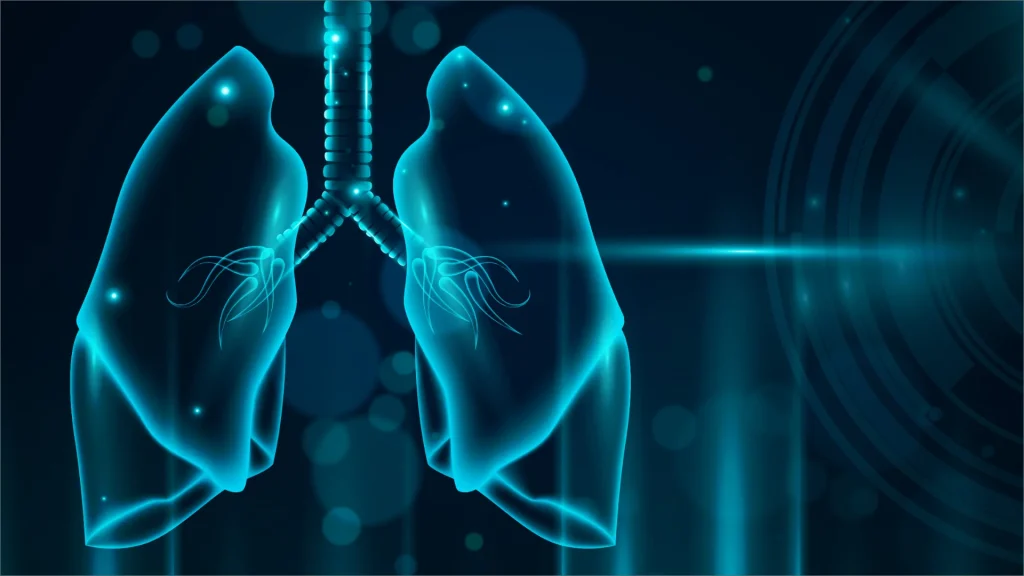Rapid Nodule Assessment Service: Expediting Lung Nodule Evaluation
The increasing use of computed tomography (CT) scans, whether for lung cancer screening, diagnostic work-ups for other conditions, or incidental findings, has led to a rise in the detection of pulmonary nodules. While the vast majority of these nodules are benign, a significant proportion can represent early-stage lung cancer. The key to lung cancer treatment is early diagnosis, necessitating a streamlined and efficient process for evaluating these nodules. Our rapid nodule assessment service is designed to provide just that: a prompt, expert, and comprehensive evaluation of suspicious lung nodules.

The Challenge of Pulmonary Nodules
A pulmonary nodule is a small, round or oval-shaped growth in the lung, typically less than 3 centimetres in diameter. They are commonly identified incidentally on chest imaging. The challenge lies in differentiating benign nodules (e.g. old infections, inflammation, granulomas) from malignant ones. Delays in evaluation can lead to anxiety for patients and, more critically, to the progression of a potentially curable cancer.
The National Lung Cancer Screening Programme in Australia can help to increase the detection of these nodules. Our service is strategically positioned to handle this anticipated increase, helping to assess findings promptly and thoroughly, aligning with the programme’s goals of early detection and improved outcomes.
The Need for Rapid Assessment
Traditional pathways for nodule evaluation can be protracted, involving multiple specialist appointments, staggered investigations, and delays in obtaining a definitive diagnosis. This fragmented approach can result in:
- Increased Patient Anxiety: The uncertainty of a potential cancer diagnosis can be profoundly stressful.
- Diagnostic Delays: Valuable time can be lost while awaiting appointments and results, potentially allowing a malignant nodule to grow or spread.
- Suboptimal Outcomes: For aggressive cancers, every week of delay can impact the feasibility of curative treatment.
The rapid nodule assessment service addresses these issues by offering an expedited, coordinated, and multidisciplinary approach to nodule evaluation.
How Our Rapid Nodule Assessment Service Works
Our service is designed to improve efficiency, clarity, and patient reassurance. The typical pathway involves:
- Expedited Referral: Patients with newly detected or suspicious lung nodules can be referred to our service, often directly by their GP or referring specialist. We prioritise these referrals to help with quick initial contact.
- Comprehensive Initial Review: Upon referral, all relevant imaging (CT, PET-CT if available, and previous scans for comparison) and clinical history are reviewed by Adrian Pick. This initial assessment helps in risk stratification.
- Prompt Consultation: If needed, an urgent consultation with Mr Pick is arranged. During this appointment, the patient’s medical history, smoking status, and any symptoms are thoroughly reviewed. The implications of the nodule are discussed clearly and sensitively.
- Coordinated Diagnostic Pathway: Based on the initial assessment, a personalised diagnostic plan is immediately formulated. This may involve:
- Further Imaging: This may include a PET-CT scan to assess the metabolic activity of the nodule, or follow-up CT scans at short intervals to monitor its growth.
- Minimally Invasive Biopsy: If a biopsy is required, this is arranged expeditiously. Options include:
- CT-guided Biopsy: Performed by a qualified radiologist.
- Bronchoscopy with Endobronchial Ultrasound (EBUS-TBNA): For centrally located nodules or lymph node assessment.
- Minimally Invasive Thoracoscopy (VATS Biopsy): For peripherally located nodules or when other methods are inconclusive.
- Multidisciplinary Team (MDT) Discussion: All complex or suspicious cases are presented and discussed at a thoracic MDT meeting, involving qualified thoracic surgeons, respiratory physicians, oncologists, radiation oncologists, and radiologists. This helps to ensure a consensus opinion on the optimal diagnostic and management strategy.
5. Timely Results and Management Plan: Once a definitive diagnosis is established, results are communicated to the patient promptly, and a comprehensive management plan is developed. If the nodule is benign, appropriate reassurance and follow-up are provided, if necessary. If it is malignant, immediate planning for treatment (e.g. surgery, radiotherapy, chemotherapy) is initiated.
Benefits of Our Rapid Nodule Assessment Service
There can be many advantages of an expedited service for both patients and referring clinicians:
Reduced Anxiety
A swift diagnostic pathway may significantly minimise the period of uncertainty and stress for patients.
Coordinated Care
Patients can benefit from a seamless journey, avoiding fragmented appointments and unnecessary delays. Our service acts as a central point of coordination for their diagnostic needs.
Earlier Diagnosis
Critical for lung cancer, allowing for intervention when the disease is most treatable.
Expert Multidisciplinary Input
Access to a team of highly qualified specialists helps to ensure that every decision is based on the latest evidence and collective expertise.
Improved Prognosis
Early diagnosis and prompt treatment can significantly improve survival rates and lead to better long-term outcomes.
Tailored Management
Every patient's journey is individualised, helping to ensure the most appropriate and effective diagnostic and therapeutic steps are taken.
Referring to Our Service
For General Practitioners and other specialists who have identified a new or suspicious pulmonary nodule in a patient, our rapid nodule assessment service provides a reliable and efficient referral pathway. Our commitment is to provide a comprehensive, timely, and patient-centred approach to nodule evaluation, ensuring that every patient receives the highest standard of care in their journey towards diagnosis and treatment.
Do not allow delays in assessment. Contact our team to discuss how our rapid nodule assessment service can assist your patients with lung nodules.
Medical Disclaimer: This article is for general information and educational purposes only. It is not a substitute for professional medical advice, diagnosis, or treatment, and does not establish a doctor-patient relationship. All medical procedures carry risks, and outcomes vary between individuals. Always seek the advice of your GP, specialist, or another appropriately qualified health professional with any questions you may have regarding a medical condition or treatment. Where further or specialised care is required, your treating practitioner can provide an appropriate referral.